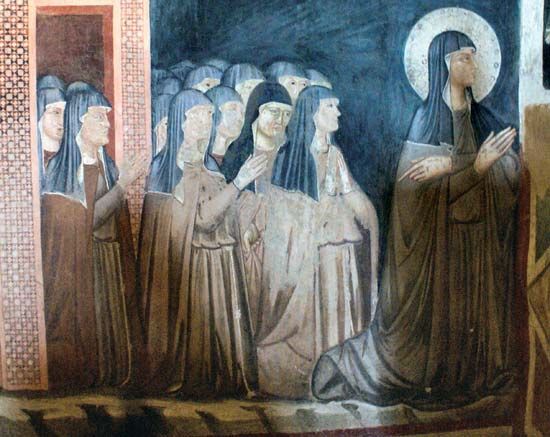Poor Clare
- Also called:
- Clarissine or Clarisse
- Date:
- 1212 - present
- Related People:
- St. Francis of Assisi
- St. Clare of Assisi
- St. Colette
News •
Poor Clare, any member of the Franciscan Order of St. Clare, a Roman Catholic religious order of nuns cofounded by St. Clare and St. Francis of Assisi in Italy in 1212. The Poor Clares are considered the second of the three Franciscan orders. Because each convent of Poor Clares is largely autonomous, practices have varied greatly, but generally the Poor Clares are regarded as one of the most austere women’s orders of the Roman Catholic Church, devoted to prayer, penance, contemplation, and manual work and usually adopting the strictest enclosure, severe fasts, and other austerities.
St. Clare was a noblewoman who took a vow of poverty and became a follower of St. Francis of Assisi. She and her following of nuns devoted themselves to a cloistered life of prayer and penance, but, when the society spread elsewhere in Europe, some communities accepted property and revenues. The society’s rule was revised a number of times until, in 1263/64, Pope Urban IV issued a rule permitting common ownership of property, greater self-governance for the order, and other concessions. The monasteries adopting this rule came to be called the Urbanist Poor Clares or officially the Order of St. Clare (O.S.C.), whereas those communities who continued to observe the stricter rule of St. Clare (as revised in 1253) became known as the Primitives.
Early in the 15th century St. Colette of Corbie (1381–1447), in France, sought to reform the order. She restored the primitive observance in 17 monasteries during her lifetime and reasserted the strict principle of poverty; her followers came to be called the Colettine Poor Clares, or Poor Clares of St. Colette (P.C.C.), and today are located mostly in France. The Capuchin Sisters, originating in Naples in 1538, and the Alcantarines, of 1631, are also Poor Clares of the strict observance.














